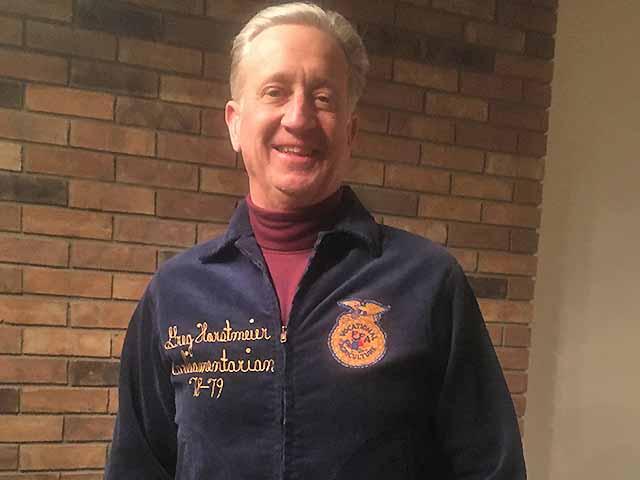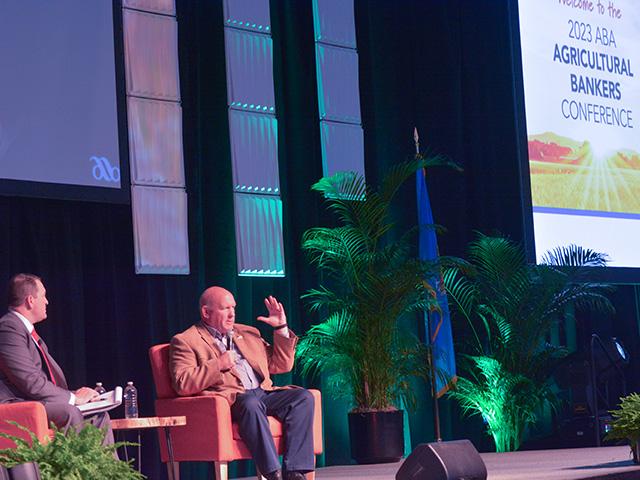Farm Bill Programs Need an Extension
House Ag Chair Agrees Long-Term Extension Needed for Farm Bill
OKLAHOMA CITY (DTN) -- The current farm bill programs will likely need an extension to the end of next September, the chairman of the House Agriculture Committee said Monday at events with agricultural leaders around Oklahoma City.
Rep. Glenn "GT" Thompson, R-Pa., spoke Monday morning to about 500 agricultural bankers from around the country then held a forum with Oklahoma Secretary of Agriculture Blayne Arthur and Rep. Frank Lucas, R-Okla., a fellow member of the House Agriculture Committee.
Thompson's comments declare all "four corners" of the House and Senate Agriculture Committee agree an extension is needed.
Thompson said there have been mixed messages about a farm-bill extension and what it means. Right now, Thompson said there isn't enough time left in the House calendar to get a farm bill completed. So far, neither the House nor the Senate have released any bill language.
"We were always going to have the need for some type of long-term extension," Thompson said at the bankers meeting, and reiterated later. "A lot of people think a long-term extension means, 'Oh, you're not going to do your job.' That's not the case."
PROVIDES CERTAINTY
Lucas, a former chairman of the House Agriculture Committee as well, backed up Thompson at the forum with producers. "Here, an extension provides certainty and certainty is one of those things we need badly," Lucas said.
While the process on a new farm bill is slow, Thompson emphasized he wants the bill to be "bi-partisan and bi-cameral."
On an extension, Rep. David Scott, D-Ga., the House Agriculture Committee ranking member, also late last week called on a one-year extension of the farm bill. Scott said the committee continues to work in a bipartisan way, but "extremism" in the House GOP has hobbled work on legislation.
"A one-year extension is the responsible thing to do. It allows our farmers, ranchers, and foresters to operate with an element of certainty while we continue working on a bipartisan five-year farm bill," Scott said.
P[L1] D[0x0] M[300x250] OOP[F] ADUNIT[] T[]
Senate Agriculture Committee Chairwoman Debbie Stabenow, D-Mich., and ranking member Sen. John Boozman, R-Ark., also have called for an extension.
WORKING ON EXTENSION LANGUAGE
The House Agriculture Committee has been working on extension language that would protect key programs such as the commodity safety net and Dairy Margin Coverage. The extension would run until Sept. 30, the end of the current fiscal year.
"That's not to mean we're going to wait until September to do a farm bill," Thompson said. "My goal is to do a farm bill as quickly as we can out of the House. And I think we're prepared to do that."
Without an extension passed by Congress before the end of December, commodity programs risk reverting back to policies going back to the 1930s and the Dairy Margin Coverage (DMC) would cease. Thompson called Dec. 31, "a critical deadline" to avoid consequences that would negatively impact the farm economy.
While Congress effectively gridlocked for a month over the GOP conflicts involving the House Speaker, Thompson said another reason the farm bill process has slowed is the Congressional Budget Office (CBO) hasn't provided budget scores on certain farm bill proposals. Those budget scores are required by law. Thompson also said USDA has been slow responding to technical requests. "So those are the two drags on us at this point," Thompson said.
SOME FARM BILL IDEAS
On reference prices, Thompson said the lack of new money for the farm bill means lawmakers are being forced to look at each commodity's financial circumstances individually rather than adjust every commodity. That comes after economists concluded increasing reference prices for every commodity by 10% would cost around $20 billion over 10 years.
"Money's tight," Thompson said. "It's difficult so we are specifically looking commodity by commodity."
Thompson pointed to financial challenges facing farmers who grow peanuts and cotton, suggesting they could see some changes in reference prices.
"All those commodities are all kind of different. They have different pressures and different markets. Things like cotton and peanuts are really kind of struggling at this point, and others are doing better than that. In the past we kind of did the same things for all commodities. With the pressures we are under economically, that just doesn't make sense, nor do I ever think it's the right thing to do. We should do it based on need."
Thompson also talked about allowing some adjustments for base acres. That's a critical issue, especially for young farmers. "To break in and not have that safety net, it's just harder," Thompson said.
The committee is looking to see if there is some flexibility to allow USDA to enroll new base acres for new farmers, Thompson said.
Thompson also would like to see some sort of disaster aid added to the crop insurance title. USDA and Congress have been providing ad-hoc disaster aid. Thompson said that often is more expensive because Congress uses disaster programs for a "Christmas tree" to add all kinds of other spending. It would be cheaper, he said, to create a program for farmers rather than relying on ad-hoc programs. The problem is the CBO doesn't factor in possible savings in that way.
Pointing to the Supreme Court ruling on California's Proposition 12, Thompson said there needs to be language in the farm bill that allows agricultural products to continue being shipped across state lines and avoiding "trade wars." The main bill surrounding that issue is the Ending Agricultural Trade Suppression (EATS) Act, but Thompson said that bill "has been demonized a bit," and farm bill language wouldn't exactly include the EATS Act, but some similar provisions.
The bankers were focused on the credit title of the farm bill. Thompson said a group of 27 lawmakers are looking at ways to increase access to credit. He expects there will be more provisions to help young and beginning farmers with greater access to credit. That would include increasing the limits on Farm Service Agency (FSA) loans. He'd also like to see some reduction in the paperwork needed for loans as well.
"How do we make that administrative process easier and more efficient?" Thompson asked.
Thompson also wants to see language in the farm bill that would ensure solar projects are not competing with producers for farm ground. Thomspon said he want to see less "green tape," describing "ESG" -- environmental, social and governance -- as "extra stupid government."
Also see, "Ag Bankers Concerned About Farmer Liquidity and Income Coming Out of 2023,"
Chris Clayton can be reached at Chris.Clayton@dtn.com
Follow him on X, formerly known as Twitter, @ChrisClaytonDTN
(c) Copyright 2023 DTN, LLC. All rights reserved.




